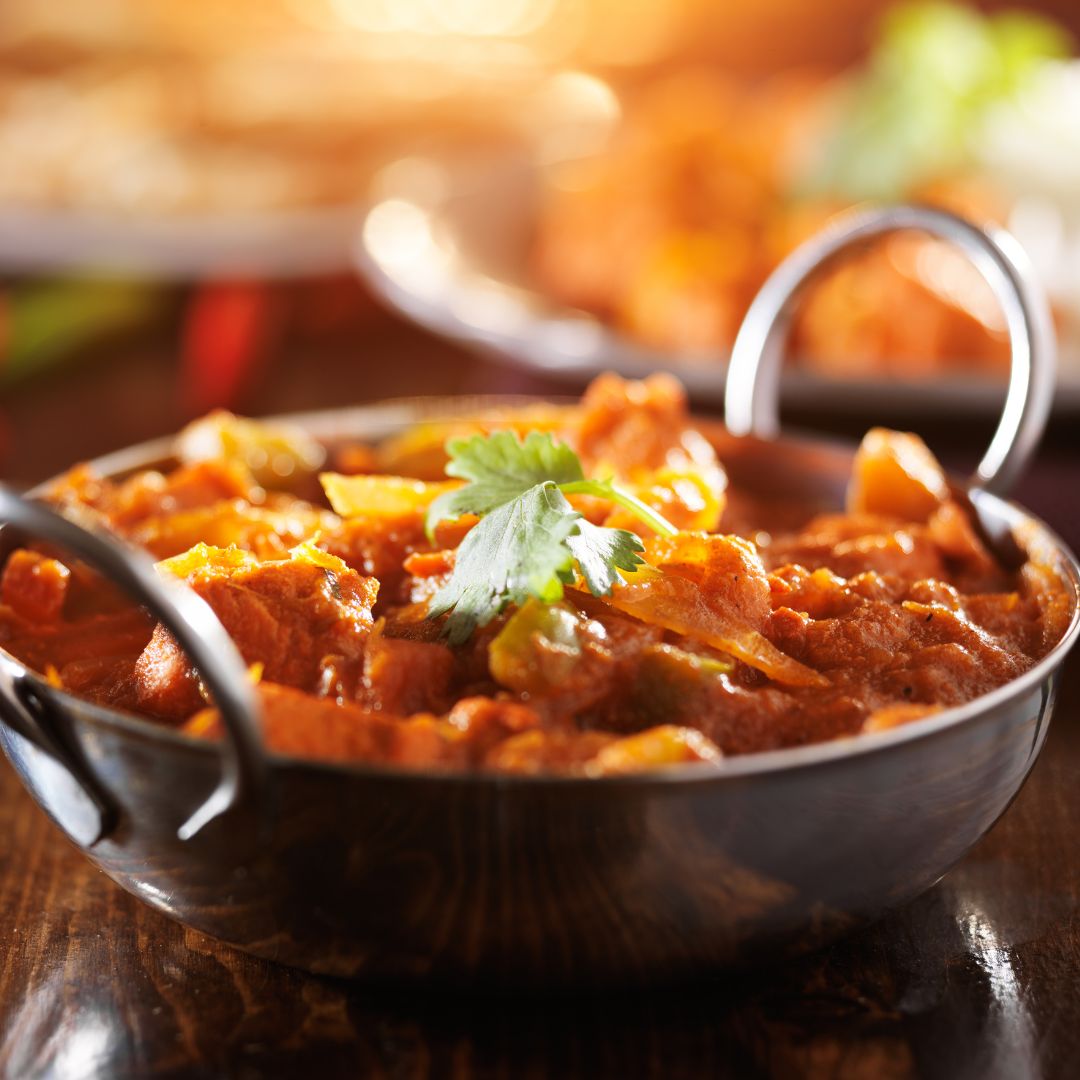
How to beat the festive bloat
We’re all prone to a little indulgence at Christmas, but rich food and overeating can play havoc with your digestion, leaving you bloated and uncomfortable. It’s not surprising - we consume on average 6,000 calories on Christmas Day alone! That’s nearly three times the recommended daily intake for women!
There are a variety of reasons why the holidays create more tummy troubles than the rest of the year:
USE YOUR SENSES
The first step in the digestive process is often overlooked, but it’s a critical one. Known as the cephalic phase, it’s triggered when you see or smell food. You are literally whetting your appetite.
When you start thinking about the lovely meal you are going to prepare, you are getting your digestive juices flowing. The enzymes in your saliva help you break down your food more easily. So, when the time comes, your body is ready to start digesting food before you have even cut the first slice – never mind actually put anything in your mouth.
It may sound like an incredibly simple step – and it is – but these days we are often so busy that we don’t make the time to think about our food in this way. If you find you’re always eating on the go, throwing a sandwich down your neck at your desk or having a TV dinner, this is a vital step you are missing out on. One trick is to be mindful and try and spend a few minutes thinking about your tasty lunch before you eat it to get the digestive juices going.
CHEW YOUR FOOD
Remember what Mum used to say? Chewing your food (the second phase of digestion) is key when it comes to good gut health. With proper chewing, you are mechanically breaking down the food into smaller pieces so that there’s a greater surface area and the digestive enzymes can get to work more easily, doing their job.
If you’re not chewing properly, it’s highly likely that you’re not digesting your food very well. And that means you won’t be absorbing the vital nutrients either. Not chewing also means that the food you eat takes much longer to break down, and, as it hangs around in your digestive system, it can start to ferment, causing uncomfortable wind, gas and bloating.
Don’t worry about chewing a certain number of times – that all depends on what you are eating and various other factors.
Instead, try this test: chew your food enough so that if someone asked you to spit it out, they wouldn’t be able to identify what it was. Another sign you need to chew more is if you start to see undigested food in your stools.
BALANCE YOUR STOMACH ACID
Sales for heartburn tablets are skyrocketing, because so many people wrongly assume that their digestive troubles are due to too much stomach acid. What nutritionists like me find more frequently in clinic is the total opposite! Getting older, stress and some over-the-counter medications can make your stomach acid levels drop to the extent that you don’t produce enough to digest food sufficiently.
Why is this important? The stomach acid you produce not only kills any bacteria in the food you are eating, it also breaks down the protein in your meal. If you’re not fully digesting the protein element in food, it can start to putrefy, creating gases that force open the oesophageal sphincter muscle (a type of ring muscle) and what little stomach acid there is can escape. So, the burning feeling, especially if accompanied by smelly gas, can be a sign your digestion isn’t working as well as it should be.
One solution is to have a teaspoon of apple cider vinegar before each main meal. It’s important you choose apple cider vinegar with the ‘mother’, rather than one you can buy in the supermarket (that’s for your chips).
Some people genuinely produce too much stomach acid and, if you try the apple cider vinegar trick and it seems to make things worse, you can neutralise the acid by taking a little bicarbonate of soda, stirred into water.
PLAN WHEN YOU WON’T EAT
As well as WHAT to eat, one of the things I find myself talking a lot about in clinic is NOT eating. It’s never truer than at this time of year.
It’s important to space out your meals, so the digestive system actually gets a chance to rest. This might require some self-discipline if your house is routinely full of bowls of nuts or towers of chocolate boxes.
Eating no more than every 4 hours is a good benchmark to aim for, and it gives the body enough time to completely digest the previous meal and have a break before you put it to work again. Of course, there will be days when your eating routine falls out of whack, but don’t beat yourself up. Just get back on track the following day.
And if any of your symptoms are really bugging you, or lasting longer than expected, why not get in touch?

Bring the Hygge
There’s so much to love about the journey into winter. If you’re in the Northern Hemisphere, cold lashing rain might be the reality, but there are so many ways you can spin the next few months so they feel like a delight for the senses rather than a drain on your reserves. How? We need to take our lead from the Scandinavians, who have the joys of this entire season rolled into one gorgeous concept Hygge.
Hygge is the concept that might just help you feel a little calmer and more content as the nights get longer. And right now is the perfect time to slow down and focus on a little self-care.
What is Hygge?
Hygge (pronounced “hoo-gah”) is a Danish word that’s all about creating a warm, cosy atmosphere. Think soft lighting, comfy clothes, and a feeling of contentment as you relax with a cup of tea in hand. It’s all about slowing down and enjoying the simple pleasures in life.
Now is the perfect time to open the door to a little hygge - as the colder months and the hustle and bustle of the holiday season approach, it’s easy for stress to creep in. Hygge offers you a way to manage that stress by creating little pockets of calm and comfort in your day-to-day life. It’s the perfect antidote to a busy, stressful winter. And what’s not to like curling up in front of a roaring fire - or under a heated blanket - with your latest novel?
So, how can you bring more hygge into your life this season? Hygge doesn’t have to be complicated. In fact, much of its beauty lies in the simplicity of it.
Here are 10 simple ways to introduce hygge into your life this winter
1.Cosy space.
Add some soft lighting, blankets, and pillows to your living room or bedroom. It doesn’t take much, but it can completely change the feel of a space.
2. Warming drinks.
There’s something incredibly comforting about holding a warm mug in your hands. Herbal teas, a healthy hot chocolate, or even a simple cup of warm milk, are perfect for chilly evenings.
3. Candles everywhere.
Lighting a candle in the evening can create a lovely, relaxing atmosphere. The soft, flickering light works wonders for calming the mind. A good quality scented one might be a real feast for the senses. If you’re not a fan of a naked flame, you’ll find an array of gorgeous winter scents made for essential oil diffusers.
4. Comfort food.
It’s that time of year when hearty soups, slow-cooked stews, or a warm bowl of porridge is on the menu. Simple, nourishing meals are the ultimate in comfort and are perfect for the colder months. Comfort doesn’t have to mean unhealthy – check out my recipe section for ideas.
5. Digital detox.
Try switching off from screens for an hour or two in the evening. Without the constant buzz of notifications, you’ll be able to unwind and relax much more easily. It can feel like a hard habit to break if you’re the kind of person who struggles to watch the TV without also scrolling - but your mind will feel less cluttered when you take the plunge.
6. Snuggle up with a book.
There’s something beautifully hygge about curling up with a good book. It’s a simple pleasure that can bring a lot of joy.
7. Connect with loved ones.
Hygge is all about togetherness, so make time to catch up with friends or family. Whether it’s in person or over a video call, those connections are so important for your wellbeing.
8. Mindful moments.
Hygge encourages us to be present and appreciate the little things. For you, that might mean savouring a cup of tea or watching the rain outside, take a few moments each day to just *be*.
9. Woolly socks and comfy clothes.
There’s nothing better than changing into something cosy at the end of the day. Consider this your sign to yourself to some soft, cashmere socks or a warm jumper.
10. Winter walks.
Although it might well be freezing outside, there’s no such thing as bad weather, only unsuitable clothing… So, wrap up in your favourite coat and head out for a stroll. Even on the coldest days, there’s something refreshing about being out in nature.
So, there you have it, and I hope you’re convinced. If you want a stress-free winter and to go ‘all in’ on the season, add hygge to the top of your to-to list. I encourage you to try out one or two of these ideas and see how they help you feel more grounded and less stressed.
Remember, it’s okay to slow down and take time for yourself, especially as the holidays approach. Hygge is a reminder that self-care isn’t selfish—it’s necessary.

How’s your blood pressure?
Is your blood pressure under 120/80mmHg? If you don’t know your numbers, here’s why it really matters.
When you know your numbers, you are then able to take steps to get yours back in control if you need to.
What is blood pressure?
Blood pressure is the force, or pressure, that blood exerts on the walls of the blood vessels. This pressure ensures a steady flow of blood into, and out of, all the organs of the body.
Keeping blood pressure within normal limits is vital.
If it is too high (hypertension), blood vessels can be damaged, causing clots, and rupture, resulting in a heart attack or stroke. If it is too low (hypotension), blood flow to the tissues may be inadequate, which is potentially very dangerous – especially if this were to affect the brain, kidneys or heart.
How do I know I have blood pressure problems?
High or low blood pressure does not always cause symptoms.
Pubescent girls, young, slim women, pregnant women and gaunt, older people are most frequently affected by low blood pressure. It can be a result of dehydration, which is particularly common in older people.
If you experience symptoms of low blood pressure (see below), and they occur frequently or very suddenly, you should get the cause clarified by your doctor.
High blood pressure or hypertension, which is more common than low blood pressure, not only affects older people. Young adults and even children can also suffer from it. What is particularly worrying is that many people affected do not know they are ill.
What causes high blood pressure?
There are many causes of hypertension. In most cases, an unhealthy diet and lifestyle are major contributory factors.
The risk of developing high blood pressure increases with age. Over the years, the blood vessels lose their elasticity and become stiffer. Often, only the upper blood pressure value (systolic pressure) is elevated in older people - this is also considered high blood pressure, which is usually treated with medication.
These days, more and more children also develop high blood pressure. In children, the main causes are being overweight and too little exercise. Maintaining a normal weight and doing daily physical activity are the best ways to protect children from high blood pressure and its consequences.
In adulthood, it affects men more often than women. About one in five men between the ages of 40 and 49 has high blood pressure. From the age of 60 onwards, women catch up. This is usually caused by the menopause, when levels of the hormone that lowers blood pressure, oestrogen, begin to fall. Women can also develop high blood pressure during pregnancy or by taking the contraceptive pill.
In rare cases, high blood pressure is the result of another disease. This is usually a kidney disease, hormone disorder or vascular disease. If this other condition can be treated successfully, blood pressure usually returns to normal.
What are the symptoms of low blood pressure?
What are the symptoms of high blood pressure?
Most people show hardly any clear symptoms of high blood pressure, so it often goes unnoticed for a long time. That’s why it’s often referred to as a ‘silent disease’. It is, therefore, important to take possible signs of high blood pressure seriously and see a doctor as soon as possible:
How can a nutrition practitioner help?
The most common underlying reason for blood pressure problems are poor diet and lifestyle choices. Even small changes to your habits and what you eat can make a big difference in a relatively short period of time.
I will ask questions about your overall health and health history, diet, lifestyle and exercise habits. I will look at your food diary to see where there may be room for improvement. I will then develop a customised diet, supplement and lifestyle plan for you. Are you interested to know more? Why not book in a free call.

Lamb and Spinach Curry
This one takes a while to cook due to the cut of meat, but it is well worth it for that Saturday night curry.
Alternatively cook on a Sunday, whilst prepping your breakfasts and lunches for the week.
Serves 4
Ingredients:
1 red onion
4 garlic cloves
600g lamb shoulder
2 tbsp coconut or oliveoil
1tsp cayenne
3tsp ground coriander
3tsp ground cumin
1tsp turmeric
1/2tsp ground cinnamon
2 cardamom pods
2 tins chopped tomatoes
1 tin coconut milk
200g fresh spinach
200g frozen peas
1 lemon
Seasoning to taste
Method:
1. Finely slice the onion, crush and finely chop the garlic and on a separate board, cut the lamb into cubes
2. Heat the oil in a large saucepan on a medium heat and cook the onion for 4-5 mins until browned. Then add the garlic, cayenne, coriander, cumin, turmeric, cinnamon and cardamom and a couple twists of black pepper. Add 4 tbsp of water and fry for a few mins until fragrant.
3. Add the lamb to the saucepan with a big pinch of salt and brown for 3-4 mins, adding water if it gets dry to prevent the spices from burning.
4. Add the tomatoes and bring the curry to a simmer. Cook for 45 mins, stirring every 15 mins.
5. Add the coconut milk, stir well and cook for a further 45 mins, again stirring every 15 mins.
6. Add the spinach and the peas and stir again until the spinach wilts.
7. Take the pan off the heat and stir in the lemon juice. Serve with cauliflower rice or a side of steamed vegetables.
8. Enjoy!

Prostate Care You Can’t Ignore
When you think about long-term health, prostate care often doesn’t come to mind until there’s an issue. Yet, the prostate plays a crucial role in men’s overall health and wellbeing so making sure it’s on your radar will be key to your (or your partner’s) long term health and happiness.
If you’ve even considered your prostate before, here’s what you need to know:
Common symptoms of BHP
Testing for BHP
You might have several different tests; some can be done at your doctor’s (like a blood test or a urine test). Others might need to be done at a hospital.
It’s likely your doctor will want to rule out some more serious conditions like prostate cancer.
The blood test is called the prostate-specific antigen (PSA) blood test. PSA is a protein made in the prostate and levels rise with the prostate gets enlarged - although levels can be affected by some illnesses or recent procedures/ surgery.
Dietary strategies for supporting prostate health
1. Balance your blood sugar levels
Eating the right balance of proteins, fibre and starches along with healthy fats has benefits for all aspects of your health. Every meal should contain a source of protein.
Choose wholegrain versions of foods like pasta, rice and bread to prevent blood sugars spiking, and fill your plate with veggies.
2. Eat more fruit and veg
A diet rich in plant-based foods provides essential vitamins, minerals, and antioxidants that protect the prostate.
Foods like tomatoes (rich in lycopene), broccoli, and green tea have all been linked to better prostate health. These nutrients help fight inflammation and reduce oxidative stress, which can contribute to prostate problems.
3. Don’t skimp on healthy fats
Not all fats are created equal and one type you’ll definitely want on the menu. Omega-3 fatty acids, found in fatty fish, like salmon and mackerel, plus walnuts and flax and chia seeds, help reduce inflammation and may lower the risk of prostate diseases.
At the same time, if you can cut back on saturated fats and processed foods, which promote inflammation, you can consider this a double win.
4. Eat foods that contain zinc
Like sesame and pumpkin seeds are naturally high in zinc, an important mineral that can be lacking in mean with prostate problems compared to those who don’t.
5. Limit alcohol and caffeine
Too much alcohol and caffeine can irritate the bladder and prostate, especially for men who are already dealing with urinary issues.
Moderation - or avoidance - is key to preventing these problems from worsening.
Lifestyle aspects
Keep an eye on your weight
Excess weight, especially around the midsection, can increase the risk of prostate problems - as well as a host of other midlife problems.
A balanced diet (like the Mediterranean-style diet described above and regular exercise will help you maintain a healthy weight and support prostate health.
Making movement matter
Regular exercise not only helps maintain a healthy weight, but it also supports prostate health.
Physical activity improves circulation and can reduce the risk of developing prostate problems. Aim for at least 150 minutes of moderate exercise per week.
Get regular check-ups
Even if you feel prostate issues aren’t a thing, do put it on your radar and be mindful of some of the symptoms. Early detection is crucial.
Make sure to schedule regular prostate screenings, especially if you’re over 50 or have a family history of prostate issues. Talking to your GP about any concerns will help catch any issues early on.
The food and lifestyle recommendations are great at any stage of life, not least midlife, so taking these on board regardless will stand you in good stead for the coming decades.
Uncomfortable truth: prostate problems are very common, and prostate cancer is on the up
Source: Prostate Cancer UK
Do you know that I also work with male clients? If you’re interested in a health check, why not get in touch. I offer free 30-minute health reviews and you can book in here.

Spotlight on Men’s Health
It's “Movember”, that time of year where normally clean-shaven men start sprouting moustaches – with varying degrees of success.
“Movember” is the leading charity for men’s health worldwide. Every year – in November – it raises awareness of men’s health issues by encouraging men to grow a moustache, move more for the 30 days of the month (at least) and run men’s health charity events at work and in their social circles. The charity funds research and education about men’s health issues, focussing primarily on suicide prevention, prostate and testicular cancer.
Suicide is the main cause of death for men and boys between the ages of 5 and 49 – a shocking and desperately sad statistics. Suicide was the main cause of death in boys and younger men even before the Coronavirus pandemic. The social isolation during the pandemic is making matters worse. 90 % of people who attempt or commit suicide have mental health problems.
More women than men suffer from depression, but women are more likely to talk about their issues and seek help. Men tend to bottle up their problems and negative feelings – until they can no longer cope. Movember is encouraging men to speak out and seek help.
The charity’s other focal subject is cancer, in particular prostate and testicular cancer. Although cancers affect both men and women, men are 60% more likely to get the disease and 70% more likely to die from cancer than women. There is much speculation about why that is.
The most common cancers in men are prostate, lung and colon cancer – in that order. The most common one – prostate cancer – is a cancer that women cannot get. Cervical cancer in women has declined due to improved screening. Screening for prostate cancer is not (yet) routinely done. One reason for that is that there is still some discussion about how useful the PSA (prostate specific antigen) reading actually is.
Throughout their life, women have a lot more contact with health professionals. Birth control, pregnancy, birth, child rearing and routine breast cancer and cervical screens means that they are in and out of doctors’ surgeries a lot more often than men as a matter of course. This reduces the reservations some may have about talking to medical professionals. It also offers ample opportunity to mention something they have been worried about. Stereotypically, men are more reluctant to make an appointment with a doctor.
The most common cause of death for men between the ages of 50 and 79, however, is still heart disease, an issue the charity does not seem to emphasise very much. The good news is that for males, the death rates from heart disease and stroke have reduced by about 50% since 2001.
The bad news is that the incidence of heart disease has barely changed. However, modern medicine has become much better at treating it, so that more people survive for longer. According to the British Heart foundation, 80% of people living with heart disease have at least one other health condition. It looks like in most cases that might be type 2 diabetes. A paper published in the European Heart Journal in 2015 found that 75% of patients with cardiovascular disease have abnormal blood sugar readings.
While deaths from heart disease and lung cancer in men have reduced by 50% and 30% respectively since 2001, there has been an increase in the death rate from Alzheimer’s and dementia of more than 60% and from liver disease by 12%. Alzheimer’s is also the leading cause of death in men over the age of 80.
Liver disease is almost entirely preventable. The most common causes are lifestyle-related: alcohol and obesity (together with hepatitis B, an infectious disease) account for 90% of cases. Alcohol is still the main reason for liver failure, but in recent years there has been a new version of liver disease: non-alcoholic fatty liver disease (NAFLD). At first, doctors often did not believe their patients when they said they didn’t drink – but presented with livers in a state of disease previously only seen in alcoholics. Now we know that something other than alcohol – sugar – can wreak just as much havoc on the liver as alcohol does.
As Alzheimer’s and dementia have been on the rise for decades, years of research have gone into finding out was causes it. Today, Alzheimer’s is referred to by some as “type 3 diabetes”, because here, too, blood sugar increases and insulin resistance has been observed. Although Alzheimer’s is known to have many contributing factors, there is no doubt that sugar is one of them.
The bottom line is that diet appears to play a major role in the leading causes of death among men. Diabetes promotes silent low-grade but long-term inflammation that damages blood vessels, nerves and liver cells. Even suicide, usually preceded by mental health issues, is not exclusively psychological. A healthy diet may not prevent all mental health problems all by itself, but a diet of ultra-processed food certainly promotes them.
So, if you are going to do just ONE thing to prolong your healthy lifespan it’s this:
Eat real food
Ultra-processed foods have been linked to cardiovascular disease, cancer, non-alcoholic liver disease, and neuro-degenerative diseases – which is code for Alzheimer’s and dementia. We’re not cut out to subsist on man-made food.
We evolved to eat natural foods: meat, fish, seafood, eggs, vegetables, fruit, nuts and seeds, herbs and spices. There is very little humans can do to improve on nature – except perhaps cooking (which allowed us to develop a bigger brain) and fermenting (which is not just a handy way to preserve food, but supports the gut).
If you are already eating real food or want to do TWO things to live a long and healthy life:
Cut out sugar and refined carbohydrates
Much of this will have left your life once you started eating real food, but there may be room for improvement. Sugar is detrimental, and all starchy carbohydrates (think bread, rice, pasta, potatoes) ultimately turn into sugar in the process of digestion.
How fast that happens and how much they will make your blood glucose rise depends on how processed they are. If you must have bread, pasta, and rice, go for the whole grain versions. Consider cutting them out altogether, because while there are essential fats and essential amino acids (the building blocks of protein), there are no essential carbohydrates. If you never eat pasta again, you’ll live. Probably a longer and healthier life to boot.
If you’re up for even more steps towards better performance, more energy and less bulge, book in for a free 30-minute men’s health review. You can do that by clicking here.
![]()
Please get in touch and find out more - I offer a free 30-minute exploratory call.